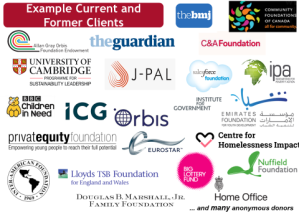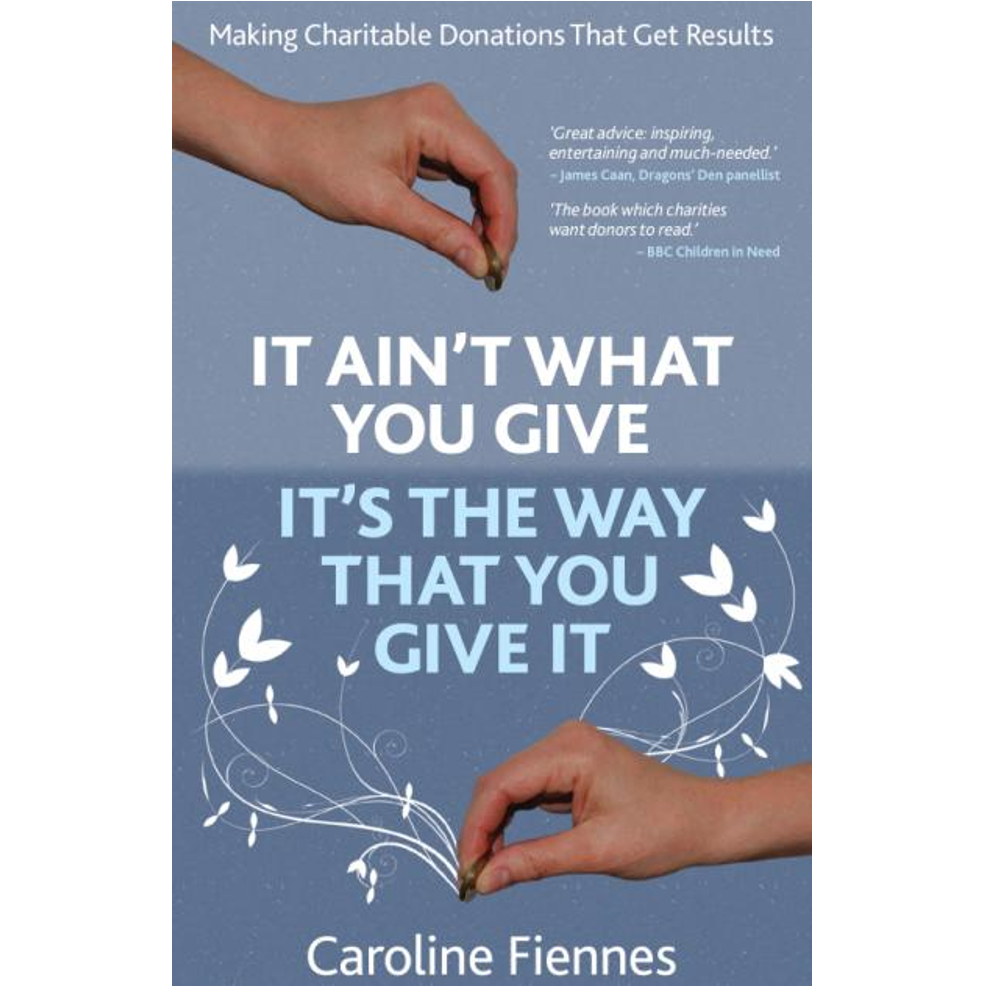Giving Evidence encourages and enables charitable giving based on sound evidence.
Our work is to improve effectiveness. We have worked with many donors, on many issues, in many sectors, over many years. Some are shown below. Hear our clients’ views about us.
We also work to improve the system for producing and using evidence by charities and donors.
Giving Evidence does broadly three types of work:
Advice for donors (consulting). This is private advice to donors, funders and foundations. Sometimes we ‘just’ identify great grantees and manage those relationships. Other times, our work is more like brain surgery, doing deep strategy reviews and re-designs, and re-shaping organisational processes to improve effectiveness.
Research and analysis (mainly, commissioned research). This results in published research. For example, we produced a systematic review (with the EPPI Centre at University College London) of the rigorous evidence around outdoor learning, commissioned by a UK foundation. We did a detailed research and analysis of whether Royal patronages help UK charities (answer: not that we could find). All our published research is here.
Speaking and writing (campaigning) to raise donors’ awareness of how to be effective. This involves speaking and writing publicly: for example, Caroline Fiennes’ 3-year Financial Times column, appearing on BBC TV, writing in Forbes, Freakonomics, the scientific journal Nature, speaking at Skoll World Forum, the Global Evidence and Implementation Summit, the Arab Foundations Forum, and to many donor groups. Much of our press is here, videos of talks are here, events are listed here.



Pingback: Charitable Giving: Why Fewer Is More
Pingback: SSIR says nonprofits shouldn't self-evaluate. They're wrong. | Nonprofit consulting services | Next in Nonprofits
Pingback: MPs should donate their payrise if they really don’t want it | Caroline Fiennes @carolinefiennes
Pingback: Co-ordinate aid using existing systems | Owen abroad
Pingback: Coordination doesn’t happen by magic – Owen abroad » Blog | Public Sector Blogs
Hi,
I just caught Caroline’s appearance on the BBC News channel at 5 o’clock talking about the Kids Company issue and the need for charities to be held and hold themselves more to account for how charity donations are spent and how they measure the effectiveness of the ways in which they spend those donations.
I worked for an umbrella charity organisation in the third sector for several years and I found that when I tried to introduce what I had learned as a former Quality Assurance Manager, I met with strong resistance on all sides. Very few of the managers of charities,(often early public sector retirees on nice salaries, thank you very much) or indeed the local politicians and community leaders who ‘supported’ them wanted to measure what the outcomes were or how valuable those outcomes were by any kind of measurements (financial, social cohesion, individual happiness and potential etc.)
I suspect they were terrified that if the records and account books were opened and the outcomes were measured, there would be a huge scandal about how much generously given donations have been wasted on grand-sounding vanity, grant-friendly sounding schemes that were never planned, never project managed and certainly never quality assured and so largely ineffective if they were delivered at all. As long as the managers, politicians, community leaders and disadvantaged group (often self-elected) representatives knew they were perceived as ‘doing good’, and were on their way to a OBE, they were happy.
I was banging my head against a brick wall so I became totally disillusioned and I left the third sector, disillusioned.
I wish i knew of an organisation with regional clout with which I could get involved to influence (if not force) local charities to implement simple QA methods to get the evidence-based best results for their donors’ bucks, If you know of such an organisation in the North East of England, I would be grateful if you could give me their contact details.
Keep up the good work and I hope things can be changed before the donors’ get disillusioned and stop giving.
All the best,
Helen McAllister
I come from a financial background and whilst not working in the charity sector I take a more than passing interest in organisations and effectiveness.
As is my wont I looked at the KC Accounts some months ago and was more than depressed to note that Trustees children were being employed by the charity. I am not saying they were not valued and valuable employees but one thing I learned when in business is never get your lines of control/communication confused by extraneous factors
And now we learn that the CEO’s personal chauffeur’s daughter was a boarder at a public school with a Trustee in common. The tangled web we weave to ……
I have been reading various Charity Acts and reports and looking at the advice and workings of the Charity Commission and it really is quite messy. I am trying to get a sensible response as to whether Trustees van award up to £2.5million in bonuses to four executives of the trading arm of a charity.
Simples …….not.
I hope Helen you find some where worthy of your talents. Caroline keep up the excellent work.
Patrick,
Interesting comments. Are you able to reference those allegations? Thanks.
Indeed, very interesting comments (although chauffeur’s daughter with trustee in common isn’t yet too incriminating).
As we have argued at Transparify (www.transparify.org), more transparency in all directions is a good thing – although we also need to be clear that quality charity work is tough, and doesn’t produce miracles. There is an infatuation with magic transformation, and we hope that transparency also leads to a better discussion, and more honesty on what it takes to make a difference.
My small Australian contribution to encouraging giving with thought and transparency: http://www.tedsherwood.com.
Pingback: The Inter-American Foundation: A donor that NGOs seem to love | Nonprofit Chronicles
Pingback: Charities need to own up to their past mistakes so we can all learn – Spear's Magazine
Dear Helen (from last year’s comment)
There is growing pressure to measure effectiveness using rigorous methods, including but not limited to randomized controlled trials. These methods have become common in International Development in the last 15 years, and are becoming more common in UK – for example through the Education Endowment Foundation. A good impact evaluation will look at process issues and so expose programmes not being implemented properly, or indeed at all.
The resistance to being evaluated is not unique to non-profits!.
These issues will be discussed at the What Works Global Summit next month wwgs2016.org, You can also read a bit more in my blog http://www.independent.co.uk/voices/evidence-based-policy-testing-policies-government-spend-public-money-better-systematic-reviews-a7208031.html
I hope you have managed to find some accountable organization to work with
Pingback: Guest blog: How do Mental health non-profits use evidence ? |
Pingback: GEIS 2018 – Day 1 | Janet Congues
Pingback: Guest blog: How do Mental health non-profits use evidence ? - What Works Wellbeing